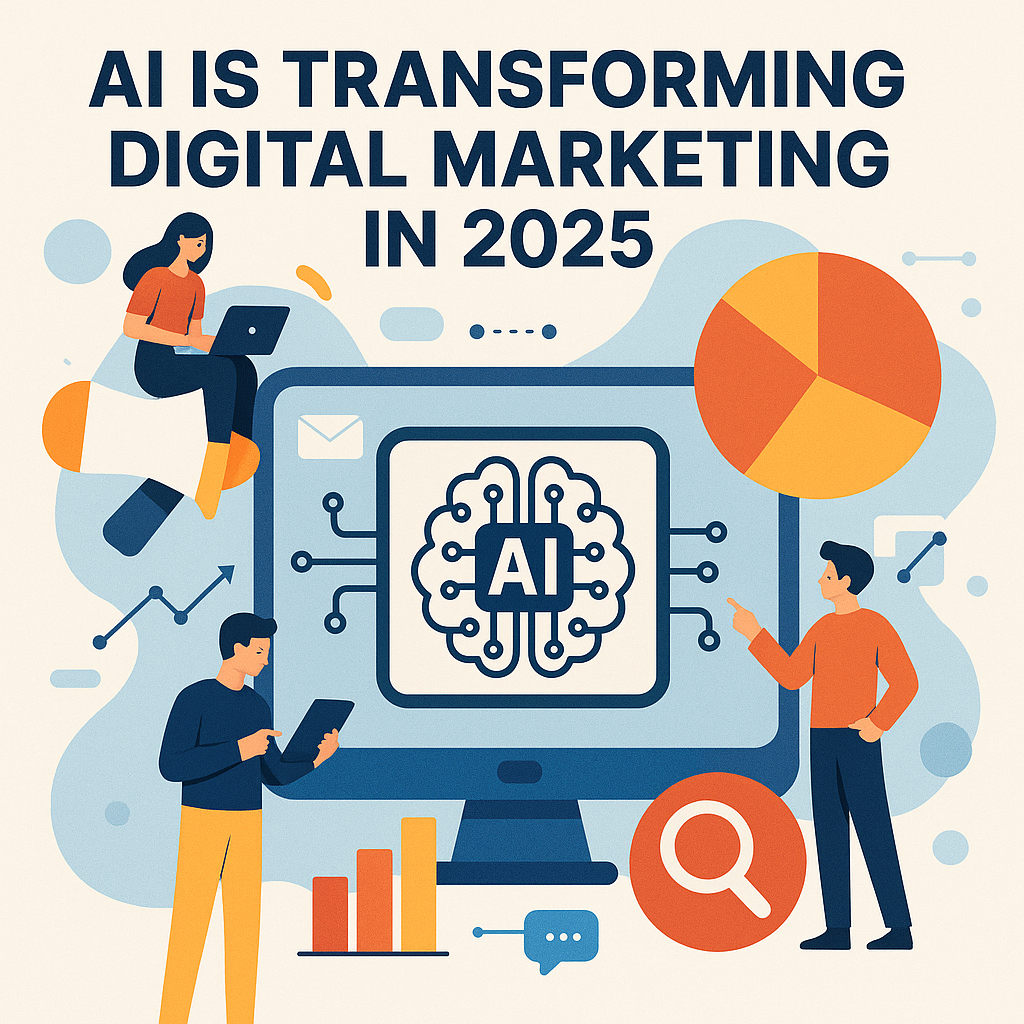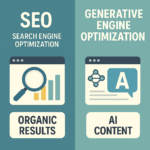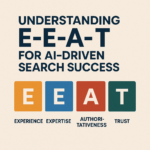How AI is Transforming Digital Marketing in 2025
The marketing landscape is undergoing a profound transformation, driven by rapid advancements in artificial intelligence. As we move through 2025, AI has evolved from a promising technology to an essential component of effective marketing strategies. This article explores how AI is reshaping digital marketing and provides insights into how forward-thinking marketers can leverage these technologies to gain a competitive edge.
The Current State of AI in Marketing
Artificial intelligence has moved beyond simple automation and basic predictive analytics. Today’s AI marketing tools offer sophisticated capabilities that were barely imaginable just a few years ago. The integration of machine learning, natural language processing, computer vision, and generative AI has created a new paradigm for how brands connect with their audiences.
According to recent industry reports, over 70% of enterprise marketing departments now use AI in some capacity, with adoption rates continuing to climb among small and medium-sized businesses. This widespread adoption is driven by tangible results: organizations implementing AI-driven marketing strategies report average increases of 30% in campaign performance and 25% reductions in customer acquisition costs.
Key Areas of AI-Driven Marketing Transformation
- Hyper-Personalized Customer Experiences
AI has revolutionized personalization, moving it far beyond simple demographic segmentation or basic behavioral targeting. Today’s AI systems can analyze thousands of data points across multiple touchpoints to create truly individualized experiences at scale.
Advanced recommendation engines now consider not just past purchases and browsing history, but subtle patterns in engagement, contextual factors, and even emotional cues derived from interaction data. This enables brands to deliver precisely tailored content, product recommendations, and offers that resonate with each customer’s specific needs and preferences at any given moment.
Case in point: Fashion retailer StyleSync implemented an AI-driven personalization engine that analyzes over 50 dimensions of customer data to create individualized shopping experiences. The result was a 45% increase in average order value and a 60% improvement in customer retention rates.
- Content Creation and Optimization
Generative AI has transformed content creation from a purely human endeavor to a collaborative process between marketers and AI systems. Today’s AI tools can generate high-quality written content, create and edit images, produce videos, and even compose music that aligns with brand guidelines and marketing objectives.
However, the most successful implementations don’t replace human creativity but enhance it. AI excels at tasks like:
- Generating first drafts and content variations for A/B testing
- Adapting existing content for different platforms and formats
- Optimizing content for both traditional SEO and generative engine optimization (GEO)
- Creating personalized content variations at scale
- Analyzing content performance and suggesting improvements
Content teams using AI-assisted workflows report productivity increases of 40-60%, allowing them to produce more high-quality content while focusing human creativity on strategy and conceptual development.
- Predictive Analytics and Decision Intelligence
AI has transformed marketing analytics from descriptive (what happened) to predictive (what will happen) and even prescriptive (what actions to take). Modern AI systems can forecast trends, anticipate customer behavior, and recommend specific marketing actions to optimize outcomes.
Decision intelligence platforms now integrate multiple data sources—including market trends, competitive intelligence, customer feedback, and campaign performance—to provide marketers with actionable recommendations. These systems continuously learn from results, improving their recommendations over time.
For example, a leading telecommunications provider implemented an AI decision intelligence system that analyzes over 200 variables to optimize channel allocation and messaging in real-time. This resulted in a 35% improvement in campaign ROI and a 28% reduction in customer churn.
- Conversational Marketing and AI Assistants
The evolution of natural language processing has transformed conversational AI from simple rule-based chatbots to sophisticated assistants capable of natural, helpful interactions. These AI assistants now serve as frontline brand representatives, handling everything from customer service inquiries to product recommendations and sales conversations.
The latest generation of conversational AI can:
- Understand complex queries and maintain context throughout conversations
- Recognize emotional cues and adjust responses accordingly
- Seamlessly transition between automated assistance and human support when needed
- Personalize interactions based on customer history and preferences
- Communicate across multiple channels while maintaining conversation continuity
Brands implementing advanced conversational AI report average increases of 40% in lead qualification rates and 30% improvements in customer satisfaction scores, while reducing support costs by 25-35%.
- Dynamic Pricing and Promotion Optimization
AI has revolutionized pricing strategies by enabling dynamic, personalized pricing models that maximize both revenue and customer satisfaction. Modern AI pricing systems analyze vast datasets including competitor pricing, demand patterns, inventory levels, customer value, and even external factors like weather or local events.
These systems can adjust prices in real-time based on changing market conditions and can even offer personalized discounts and promotions tailored to individual customer price sensitivity and lifetime value projections.
E-commerce companies using AI-driven pricing strategies report average revenue increases of 5-15% and margin improvements of 10-20%, while maintaining or improving customer satisfaction metrics.
Emerging AI Marketing Trends for 2025 and Beyond
- Multimodal AI Marketing Systems
The next frontier in AI marketing is multimodal systems that can process and generate content across different formats—text, images, audio, and video—simultaneously. These systems understand the relationships between different content types and can create cohesive, cross-format marketing assets.
For example, a multimodal AI might analyze a product image, customer reviews, and market positioning to generate a complete marketing package including product descriptions, social media posts, email content, and even video scripts—all aligned with brand voice and campaign objectives.
- Emotion AI and Sentiment Analysis
Advanced emotion AI systems can now detect subtle emotional cues from text, voice, facial expressions, and even interaction patterns. This enables marketers to understand not just what customers are doing, but how they’re feeling throughout their journey.
Leading brands are using emotion AI to optimize customer experiences, adjust messaging based on emotional context, and identify pain points that might not be captured by traditional feedback mechanisms.
- AI-Driven Immersive Experiences
The convergence of AI with augmented reality (AR) and virtual reality (VR) is creating new possibilities for immersive marketing experiences. AI can personalize these experiences in real-time, adapting virtual environments and interactions based on user behavior and preferences.
From virtual product try-ons to AI-customized virtual stores, these technologies are blurring the line between digital and physical shopping experiences while collecting valuable data on customer preferences and behaviors.
- Autonomous Marketing Systems
We’re beginning to see the emergence of autonomous marketing systems that can plan, execute, and optimize campaigns with minimal human intervention. These systems continuously test different approaches, learn from results, and adapt strategies in real-time.
While human marketers still set objectives and creative direction, AI systems increasingly handle tactical execution and optimization, freeing marketing teams to focus on strategy and innovation.

Implementing AI in Your Marketing Strategy
Despite the clear benefits, many organizations still struggle with effective AI implementation. Here are key considerations for marketers looking to leverage AI successfully:
- Start with Clear Objectives
Successful AI implementation begins with clearly defined business objectives rather than technology-driven initiatives. Identify specific marketing challenges or opportunities where AI can deliver measurable value, and establish clear KPIs to evaluate success.
- Prioritize Data Quality and Integration
AI systems are only as good as the data they’re trained on. Invest in data infrastructure that provides clean, comprehensive, and accessible data. Focus on integrating data across touchpoints to create a unified view of customer interactions and marketing performance.
- Build AI Literacy Across Teams
Effective AI implementation requires marketers who understand both the capabilities and limitations of AI technologies. Invest in training programs that build AI literacy across marketing teams, enabling them to collaborate effectively with data scientists and AI specialists.
- Adopt a Test-and-Learn Approach
Rather than attempting comprehensive AI transformation all at once, start with focused pilot projects that can demonstrate value quickly. Use these initial successes to build organizational support and inform broader implementation strategies.
- Address Ethical Considerations Proactively
As AI becomes more central to marketing operations, ethical considerations around data privacy, algorithmic bias, and transparency become increasingly important. Develop clear ethical guidelines for AI use and implement governance processes to ensure responsible deployment.
Conclusion: The Human-AI Marketing Partnership
The most successful marketing organizations in 2025 aren’t those that have simply deployed the most advanced AI technologies. Rather, they’re the ones that have effectively integrated AI capabilities with human creativity, strategic thinking, and emotional intelligence.
AI excels at analyzing vast datasets, identifying patterns, executing tactical optimizations, and scaling personalization. Human marketers bring creativity, empathy, ethical judgment, and strategic vision. Together, they form a powerful partnership that can deliver marketing experiences that are both highly optimized and deeply human.
As we look to the future, the most important question isn’t whether AI will transform marketing—it already has. The question is how marketers will adapt to this new reality, leveraging AI as a powerful tool while continuing to provide the human insight and creativity that truly connects with customers.
To learn more about implementing AI in your marketing strategy, explore our course about Generative Engine Optimization.





